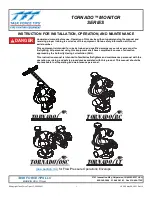
- 4 -
1. Safety & Warnings
1.3 Safety Instructions Governing Specific Operational Phases
•
Avoid unsafe operation of the equipment.
•
The machine is only to be operated when it is in good running order. Only operate the
equipment in a safe manner; all protective and safety devices must be in place and fully
functional. This includes removable safety devices, emergency shut-off equipment, noise-
protection devices and exhaust fans.
•
The machine is to be checked for damage and defects at least once each work shift. Any
changes, including the working behavior of the machine, are to be reported immediately.
•
If necessary, the machine is to be stopped and locked-out immediately.
•
In case of a malfunction, the strapping machine is to be immediately stopped and locked-out
until the fault has been eliminated.
•
Before starting the strapping machine, make sure that the area is clear and safe.
•
Do not place any tools or parts onto the machine.
•
Operating personnel needs to be well trained before executing special operations and
maintenance work; this work needs to be done with the proper supervision.
•
Always check and tighten connections after maintenance or repair.
•
After completing maintenance or repair, all safety devices must be replaced and checked for
functionality before operating the equipment.
•
To minimize the environmental impact, all consumables and replaced parts must be disposed of
safely.
•
Before starting the machine, check that the accessories have been stowed away safely.
•
Avoid operating the machine in a fashion that could upset its stability.
1.4 Electrical Dangers
•
Immediately remove power to the machine in case of trouble in the electrical system.
•
Replace a fuse with one with the same style and ratings; pay particular attention to matching
the specified current.
•
Any electrical work performed on the equipment must be conducted by a skilled electrician or
under the supervision of a skilled electrician. All work must be observed good electrical
engineering practice and follow safety rules and local wiring standards.
•
Inspect the electrical equipment of the machine at regular intervals. Tighten any loose
connections. Check wiring for scorch marks; replace scorched wiring and determine and correct
the reason for the overheating.
•
When working on live equipment, ensure that a second person is available to cut power in case
of an emergency. When appropriate, secure the working area with safety tape and a warning
sign. Use insulated tools for electrical work.
•
Before working on high-voltage assemblies, turn off the power supply. Carefully discharge the
supply cable and short-circuit any energy-storage components such as capacitors.
•
If the equipment was moved, carefully refit and refasten all parts removed for transport before
reapplying power.
•
Before moving the machine, remember to disconnect the power cable.
Summary of Contents for 715RS
Page 18: ...18...
Page 24: ...24...
Page 27: ...27 Brush Clearance...
Page 33: ...33...
Page 35: ...35...
Page 38: ...38 8 Parts List Illustrations...





































